python 把图片转为矢量图的库_mob649e815d65e6的技术博客_51CTO博客
sudo apt install potrace
python
from PIL import Image
import subprocess
def bitmap_to_svg(input_image_path, output_svg_path):
image = Image.open(input_image_path)
image = image.convert('1') # 黑白图像
bitmap_path = "temp.bmp"
image.save(bitmap_path, "BMP")
subprocess.run(['potrace', bitmap_path, '-s', '-o', output_svg_path])
print(f"Converted {input_image_path} to {output_svg_path}")
bitmap_to_svg("data/2.jpg", "output/output_image.svg")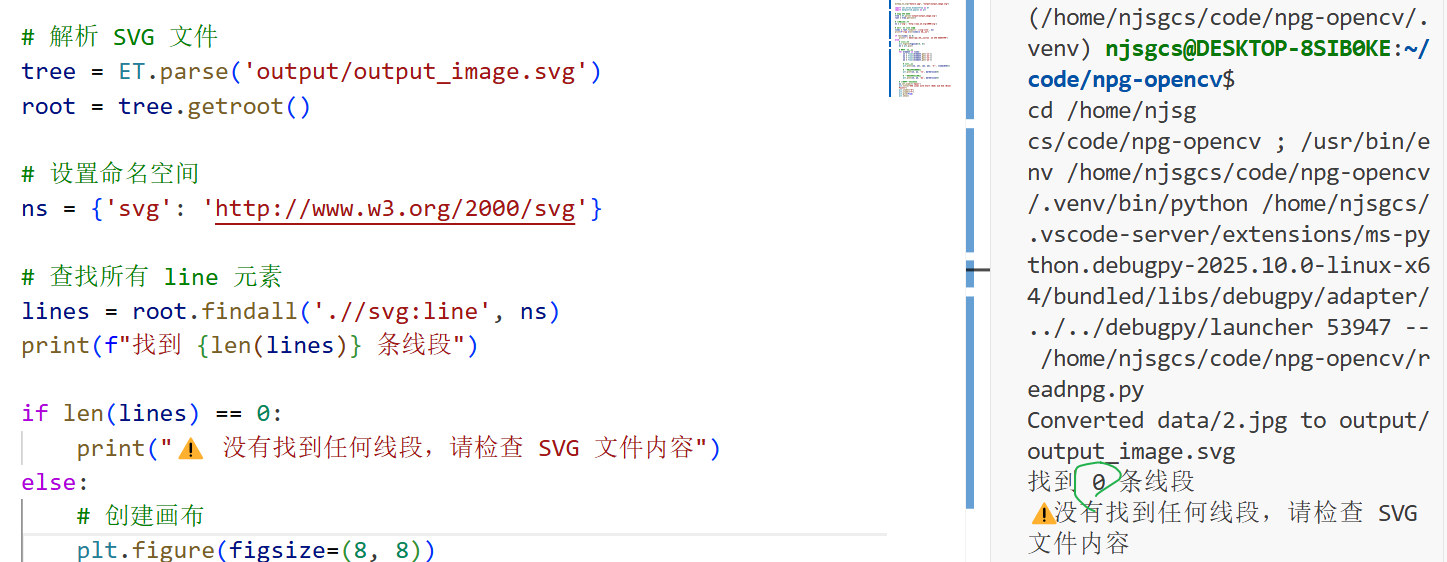
ai又在写鬼东西
python
svgpathtools matplotlib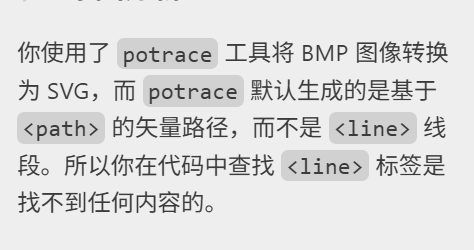
python
from svgpathtools import svg2paths
import ezdxf
# 解析 SVG 文件
paths, attributes = svg2paths('output/output_image.svg')
# 创建一个新的 DXF 文档
doc = ezdxf.new(dxfversion='R2010')
msp = doc.modelspace()
# 将 SVG 路径转换为 DXF 实体
for path in paths:
for segment in path:
if segment.__class__.__name__ == 'Line':
start = (segment.start.real, segment.start.imag)
end = (segment.end.real, segment.end.imag)
msp.add_line(start, end, dxfattribs={'color': 5})
elif segment.__class__.__name__ == 'CubicBezier':
start = (segment.start.real, segment.start.imag)
control1 = (segment.control1.real, segment.control1.imag)
control2 = (segment.control2.real, segment.control2.imag)
end = (segment.end.real, segment.end.imag)
print('CubicBezier',start, control1, control2, end)
msp.add_line(start, end, dxfattribs={'color': 1})
elif segment.__class__.__name__ == 'Arc':
center = (segment.center.real, segment.center.imag)
radius = segment.radius
start_angle = segment.start_angle
end_angle = segment.end_angle
msp.add_arc(center=center, radius=radius, start_angle=start_angle, end_angle=end_angle)
# 保存 DXF 文件
doc.saveas('output/output_image.dxf')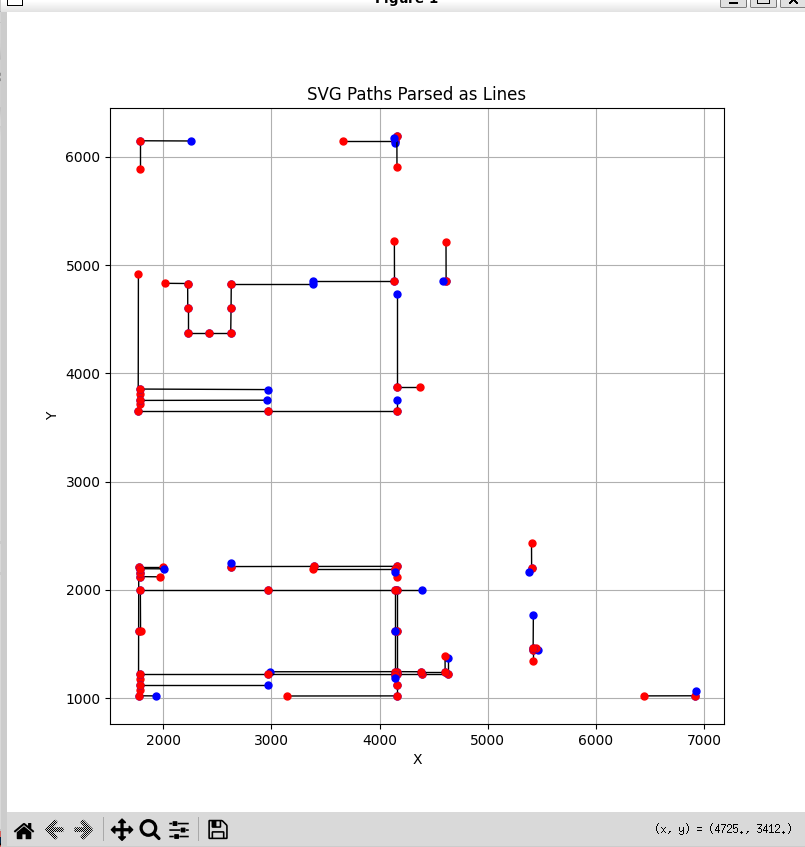
svg长这样
我本来以为svg是纯线段结构
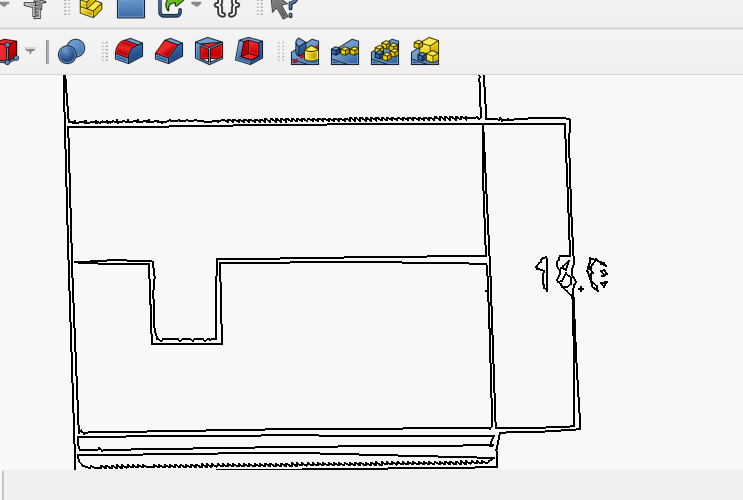 CubicBezier红色多段线, 蓝色直线,圆弧黄色(没识别到)
CubicBezier红色多段线, 蓝色直线,圆弧黄色(没识别到)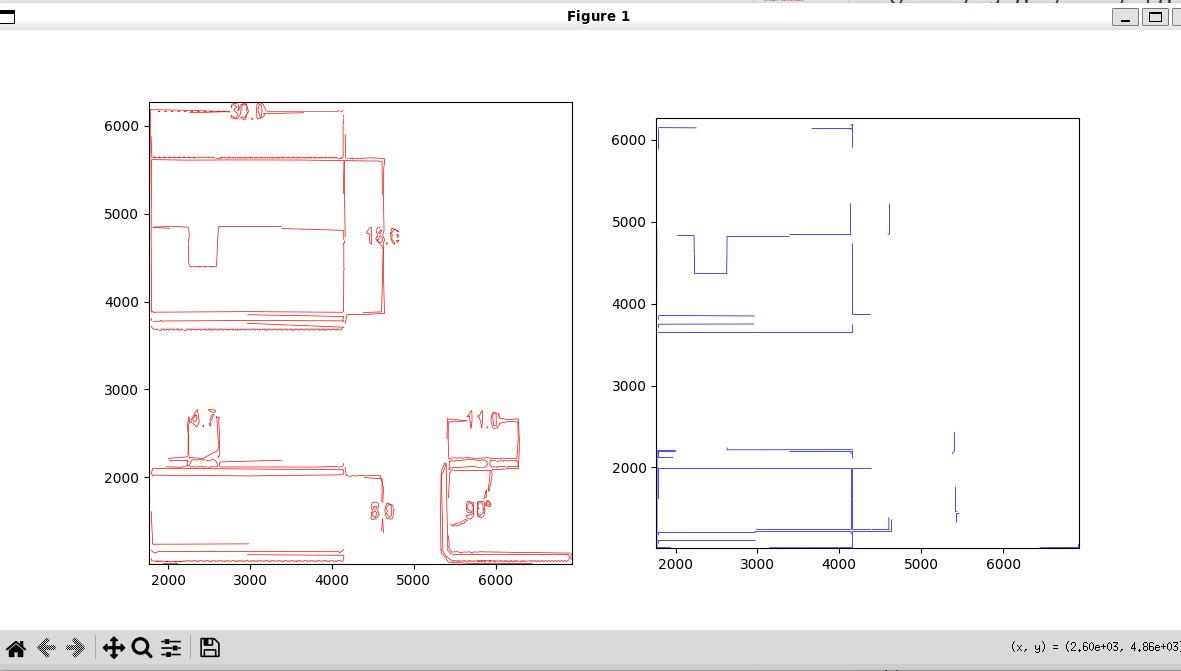
python
import ezdxf
import numpy as np
from matplotlib import pyplot as plt
from matplotlib.collections import LineCollection
from matplotlib.patches import Arc
# 指定要读取的DXF文件路径
dxf_file_path = 'output/output_image.dxf'
# 加载DXF文件
doc = ezdxf.readfile(dxf_file_path)
msp = doc.modelspace() # 获取模型空间
# 创建一个图形对象和坐标轴对象
fig, (ax1, ax2) = plt.subplots(1, 2, figsize=(12, 6)) # 1行2列的子图布局
# 准备一个列表用于存储所有的线段
rlines = []
blines = []
# 遍历模型空间中的所有实体
for entity in msp:
if entity.dxftype() == 'LINE': # 如果是直线
# 添加起点和终点到lines列表
if entity.dxf.color==1:
rlines.append([(entity.dxf.start.x, entity.dxf.start.y),
(entity.dxf.end.x, entity.dxf.end.y)])
elif entity.dxf.color==5:
blines.append([(entity.dxf.start.x, entity.dxf.start.y),
(entity.dxf.end.x, entity.dxf.end.y)])
elif entity.dxftype() == 'SPLINE': # 如果是样条曲线
fit_points = entity.control_points
rlines.append([(fit_points[0][0], fit_points[0][1]),
(fit_points[-1][0], fit_points[-1][1])])
elif entity.dxftype() == 'ARC': # 如果是圆弧
arc = entity
center = (arc.dxf.center.x, arc.dxf.center.y)
radius = arc.dxf.radius
start_angle = arc.dxf.start_angle
end_angle = arc.dxf.end_angle
if start_angle > end_angle:
end_angle += 360 # 确保角度范围正确
# 使用matplotlib的Arc类绘制圆弧
arc_patch = Arc(center, 2*radius, 2*radius, angle=0,
theta1=start_angle, theta2=end_angle,
color='blue', linewidth=0.5)
ax.add_patch(arc_patch)
else:
print('未处理的实体类型:', entity.dxftype())
# 使用LineCollection绘制所有的线段
line_segments_red = LineCollection(rlines, linewidths=0.5, colors='red')
ax1.add_collection(line_segments_red)
line_segments_blue = LineCollection(blines, linewidths=0.5, colors='blue')
ax2.add_collection(line_segments_blue)
# 设置坐标范围
lines=rlines + blines
ax1.set_xlim(min([min(l[0][0], l[1][0]) for l in lines])-5, max([max(l[0][0], l[1][0]) for l in lines])+5)
ax1.set_ylim(min([min(l[0][1], l[1][1]) for l in lines])-5, max([max(l[0][1], l[1][1]) for l in lines])+5)
ax2.set_xlim(min([min(l[0][0], l[1][0]) for l in lines])-5, max([max(l[0][0], l[1][0]) for l in lines])+5)
ax2.set_ylim(min([min(l[0][1], l[1][1]) for l in lines])-5, max([max(l[0][1], l[1][1]) for l in lines])+5)
plt.gca().set_aspect('equal', adjustable='box') # 固定比例
plt.show()转成svg对识别工程图不知道有没有用